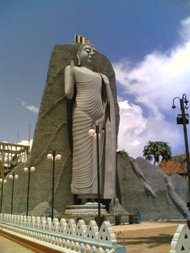Code of management
July 25, 2010, 9:17 pmhttp://www.island.lk
By Anupriyo Mallick
The Statesman/ANN
THE culture and character of a country are based on its social, political and economic environment. From that culture springs the national ethos, which prescribes a code of conduct for its citizens and creates the context for business ethics and values.
The Indian ethos and wisdom, a legacy from its ancient past, envisaged a socialist pattern of society, with an accent on re-distribution. It has always been a champion of renunciation and rectitude, rather than accumulation and aggrandisement. Mahatma Gandhi once remarked that it was difficult, but not impossible, to be an honest businessman; but it was impossible to be honest, and also, amass wealth.
Considering the contemporary commercial scenario, certain issues call for reflection. The media all too often carries reports of financial scams and scandals. Even the world of sports is tainted with treachery, perversion and political skullduggery. Where is the scope for relief and redemption?
The distressing scenario makes it imperative that basic ethical norms should form part of a professional career. Perhaps, the curriculum of management education could be restructured to reflect its national culture and character.
Ethics and values must find a place in the art and science of management. The ability to do the right thing and, what is more important, doing it every time (even when no one is watching) is the noblesse oblige in the managerial milieu. It must become the hallmark of a professional manager.
Three facets
EVERY man has three facets ~ the gross or physical (sthoola) the subtle (sookshma) and the casual (kaarana). While the physique is strengthened through food, the mind is purified by pure desires. The "casual body" represented by the antahkarana (conscience) is sanctified by sacred thoughts. The inherent divinity of man is thus manifest and the fullness of life achieved. It is this sense of unity that has been the core of India’s traditional culture. It has sought to promote the well-being of all as a cardinal faith. When Indians realise the value of this heritage, they will make their lives meaningful.
Every country has developed its institutions and way of life on the basis of its cultural traditions, its system of values, and its historic circumstances. These institutions and value systems cannot be transplanted to other countries whose history, culture and circumstances are different. For instance, the management patterns in the United States and Japan are different. In America, the management pattern is based on a competitive and profit-oriented system. The equation between the management and workers is based on "hiring and firing". Money and profits are more important than human values. By emulating the American management model, we in India are encountering difficulties and are not reaping the benefits we expected.
In Japan, the management pattern is different. The workers have a high sense of discipline and even when they have grievances, they do not resort to strikes which affect production. Relations between the management and workers are generally cordial and cooperative. This has helped Japan to progress.
There are certain features that are common to all business organisations in any country. These relate to such matters as accounts, production procedures, and maintenance of statistics, materials management and the like. But as regards business ethics and human relations, we in India have to choose our patterns in keeping with our culture, traditions and conditions. MBA institutes need to attach special importance to cultural and ethical values.
Priority must be given to the country’s ethos and values. The course curriculum should cover matters such as the economic environment, with due emphasis on personnel management. It doesn’t make sense to emulate the management practices of another country. This can lead to a waste of resources. And this is precisely what is happening in many countries, including India. What is beneficial for one country need not necessarily be beneficial for another. The parameters ought to be the circumstances, the individual attainments and the specific requirements of our country.
Different values
THE attempt to combine different sets of values may result in the loss of values of the less developed country. There is a story which illustrates how listening to the views of all and sundry can reduce one to a laughing stock. A fruit vendor put up a signboard which read: "Fruits are sold here." A passerby told the shopkeeper the word "here" in the sign board was superfluous. The vendor got the word erased. Another person remarked that there was no need to announce that fruits were being "sold" as that was obvious. Accordingly, the word "sold" was erased. A third man said that there was no need to mention that "fruits" were being sold, as that was visible to everybody. Eventually, all that remained was a blank board. Yet the designer advanced a bill both for the art-work and the erasure. The fruitseller realised the folly of acting on the opinions of every passerby without relying on his own judgment.
In the sphere of business management, a similar situation has developed in India. By following the advice of other countries, India has harmed its economy and finances.
The pursuit of money as an end in itself is making people greedy. Many farmers are switching over to profitable crops. This is not the kind of management we can afford. We should be concerned with "man management". The proper study of mankind is man. The management institutes should offer a mix of Indian culture and values on the one hand and such conventional disciplines as production, accounts, finance and personnel on the other. If the spiritual aspect is neglected in management education, man is reduced to an artificial, mechanical being with no genuine human qualities.
The writer is Professor, Eastern Institute for Integrated Learning in Management, Kolkata





No comments:
Post a Comment